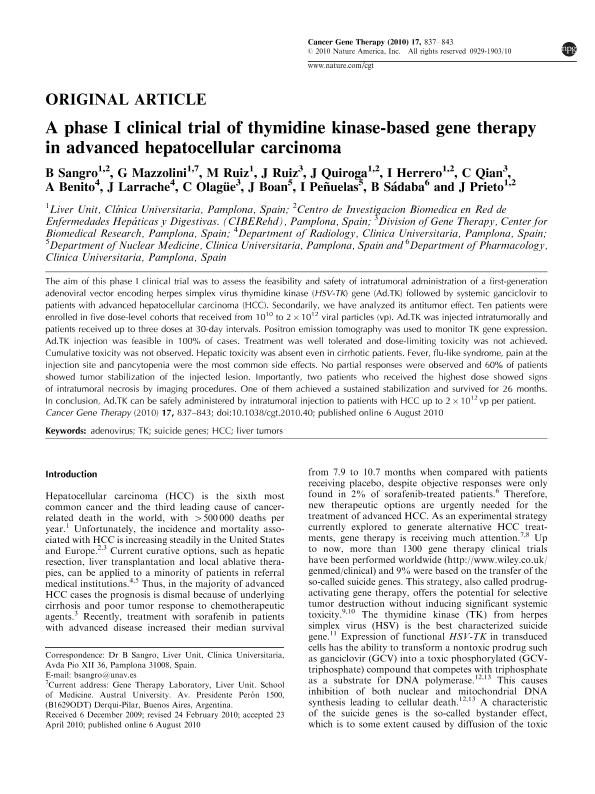Artículo
A phase I clinical trial of thymidine kinase-based gene therapy in advanced hepatocellular carcinoma
Sangro, B.; Mazzolini Rizzo, Guillermo Daniel ; Ruiz, M.; Ruiz, J.; Quiroga, J.; Herrero, I.; Qian, C.; Benito, A.; Larrache, J.; Olagüe, C.; Boan, J.; Peñuelas, I.; Sádaba, B.; Prieto, J.
; Ruiz, M.; Ruiz, J.; Quiroga, J.; Herrero, I.; Qian, C.; Benito, A.; Larrache, J.; Olagüe, C.; Boan, J.; Peñuelas, I.; Sádaba, B.; Prieto, J.
 ; Ruiz, M.; Ruiz, J.; Quiroga, J.; Herrero, I.; Qian, C.; Benito, A.; Larrache, J.; Olagüe, C.; Boan, J.; Peñuelas, I.; Sádaba, B.; Prieto, J.
; Ruiz, M.; Ruiz, J.; Quiroga, J.; Herrero, I.; Qian, C.; Benito, A.; Larrache, J.; Olagüe, C.; Boan, J.; Peñuelas, I.; Sádaba, B.; Prieto, J.
Fecha de publicación:
12/2010
Editorial:
Nature Publishing Group
Revista:
Cancer Gene Therapy
ISSN:
0929-1903
Idioma:
Inglés
Tipo de recurso:
Artículo publicado
Clasificación temática:
Resumen
The aim of this phase I clinical trial was to assess the feasibility and safety of intratumoral administration of a first-generation adenoviral vector encoding herpes simplex virus thymidine kinase (HSV-TK) gene (Ad.TK) followed by systemic ganciclovir to patients with advanced hepatocellular carcinoma (HCC). Secondarily, we have analyzed its antitumor effect. Ten patients were enrolled in five dose-level cohorts that received from 10 10 to 2 × 10 12 viral particles (vp). Ad.TK was injected intratumorally and patients received up to three doses at 30-day intervals. Positron emission tomography was used to monitor TK gene expression. Ad.TK injection was feasible in 100% of cases. Treatment was well tolerated and dose-limiting toxicity was not achieved. Cumulative toxicity was not observed. Hepatic toxicity was absent even in cirrhotic patients. Fever, flu-like syndrome, pain at the injection site and pancytopenia were the most common side effects. No partial responses were observed and 60% of patients showed tumor stabilization of the injected lesion. Importantly, two patients who received the highest dose showed signs of intratumoral necrosis by imaging procedures. One of them achieved a sustained stabilization and survived for 26 months. In conclusion, Ad.TK can be safely administered by intratumoral injection to patients with HCC up to 2 × 10 12 vp per patient.
Palabras clave:
Thymidine kinase
,
Hepatocellular carcinoma
,
Gene therapy
,
Phase I
,
Adenovirus
Archivos asociados
Licencia
Identificadores
Colecciones
Articulos(SEDE CENTRAL)
Articulos de SEDE CENTRAL
Articulos de SEDE CENTRAL
Citación
Sangro, B.; Mazzolini Rizzo, Guillermo Daniel; Ruiz, M.; Ruiz, J.; Quiroga, J.; et al.; A phase I clinical trial of thymidine kinase-based gene therapy in advanced hepatocellular carcinoma; Nature Publishing Group; Cancer Gene Therapy; 17; 12; 12-2010; 837-843
Compartir
Altmétricas



